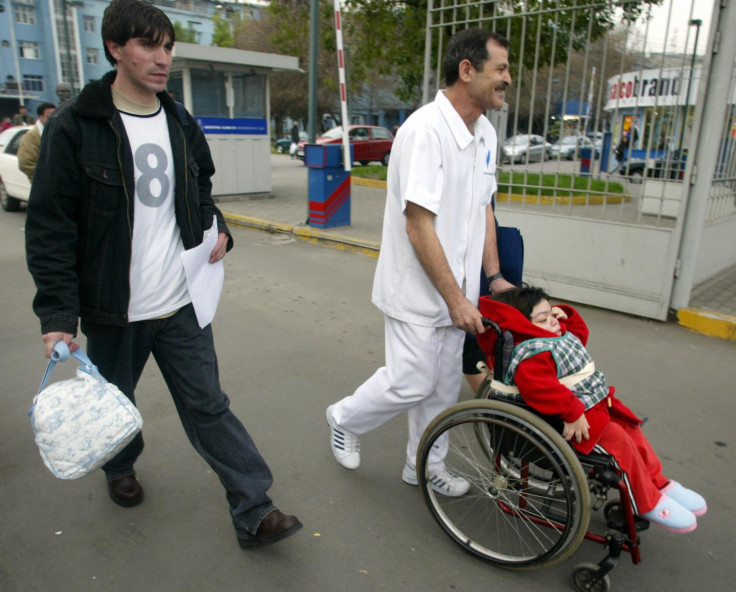Rare Disease Day 2015: Morquio Syndrome - the condition that affects just 105 people in the UK

Only 105 people in Britain and one in 200,000 to 300,000 in the United States are affected by a hereditary condition called Morquio syndrome. Yet while most people will not have heard of the degenerative disease, it has severe consequences for sufferers. From skeletal abnormalities to cardiac problems, Morquio has a range of devastating symptoms that can reduce life expectancy.
Chris Smeaton, 29, from Keighley, West Yorkshire, is a financial advisor in London. He was diagnosed with Morquio syndrome at the age of 13.
"In the early stages, the symptoms are similar to Spondyloepiphyseal dysplasia tarda – a rare disorder affecting bone growth – so from about the age of six I was tested and treated for that," Smeaton says. "Someone had a second thought and came back with the Morquio diagnosis later."
"I have a short stature, aching joints, blurred vision, a squashed vertebrate and brittle bones, so I use crutches for mobility. I'm also prone to chest infections," he says. "I guess the symptoms affect my life because there is always some degree of pain. Some days are worse than others."
Morquio syndrome is an inherited disease in which the body cannot break down long chains of sugar molecules called glycosaminoglycans, which help build bone, cartilage, eye corneas, skin and connective tissue. It is a progressive disease, meaning symptoms get worse or accumulate over time.
People with Morquio syndrome either do no produce enough of the enzymes to break down sugar chains into simpler molecules, or they produce enzymes that do not work properly. There are two types of the condition: Type A, in which an enzyme called galactosamine-6-sulfatase is missing; and Type B, in which there is not enough of the enzyme beta-galactosidase.
Charlotte Roberts, of the Society for Mucopolysaccharide Diseases, told IBTimes UK that patients with the syndrome appear healthy at birth, but severe symptoms appear after around 24 months such as skeletal abnormalities, vision and hearing loss and difficulty breathing. To raise awareness of the condition and the campaign for medication, the MPS Society has released a film with David Suchet.
"Children with Morquio rarely live beyond 25 years," she says. "The damage to bones and joints causes considerable pain and serious lack of endurance. The signs and symptoms that go along with this unpredictable disease can lead to damage in multiple organs and systems. Cognitively though Morquio children are very bright and usually able to go on to University if the physical symptoms allow."
There is currently no cure for Morquio syndrome. Last year, the drug Vimizim was approved by the US Food and Drug Administration and by the European Medicines Agency for the treatment of the symptoms. It is now commercially available in France, Germany, Netherlands, Italy, the United States, Canada, Russia and Indonesia, but although the UK played a leading role in the research and development of the drug, it is not currently available here.
Patients, like Smeaton, are waiting to see if the NHS will meet the £198,000-a-year bill for the medication. It will take time, though, as the process to evaluate whether drugs are signed off proved to be discriminatory against rare diseases – forcing the government to scrap the system and come up with a new process in December 2014. A consultation on the changes is now expected in April, but there has been no word on the medication.
"Vimizim brings multiple benefits: increasing energy and stamina; improving the ability to walk; preserving vision by preventing corneal clouding; lessening chest infections and breathing difficulties; improving sleep; and making pain levels more predictable and manageable," Roberts says.
"Collectively, these changes enable those with Morquio to complete normal day-to-day activities independently," she adds. "Children treated with Vimizim continue to grow and develop stronger posture, unlike those without treatment."
Although Smeaton was not involved in the trial, he has previously spoken out about the need for the drug to be available in the UK.
"I believe it had positive results – hence the current campaign to make it more accessible," he said.
"I think the powers that oversee the approval of medicines do so from a utilitarian standpoint though – how many people will benefit when Morquio is rare? It is sadly not seen as much of a priority, regardless of how greatly it improves someone's quality of life.
"The older I become, more complications arise with spine, breathing, an enhanced risk of sight loss and deafness," Smeaton says. "At worst, the drug acts as a vital damage-limiting tool, at best, it eradicates existing symptoms so I may not need to rely on crutches to get around."
"As a person with the condition I understand I'm quite lucky and it could be much worse, so I feel lucky about that. I think having long-term symptoms teaches empathy too, as you can respect and understand people who are in a much more unfortunate situation."
© Copyright IBTimes 2024. All rights reserved.






